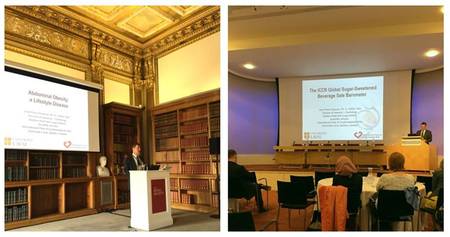On 22 September 2016, the International Chair on Cardiometabolic Risk (ICCR) and the European Healthy Lifestyle Alliance (EHLA) UK partnered with The Sugar Reduction Summit to deliver a one-day conference for public health professionals, policymakers, industry representatives, academics, and health and wellness communities.
The day explored the impact of both legislative and voluntary action to reduce the impact of sugar on our health, and the science behind the need to change our lifestyles to incorporate not just a reduction in sugar-sweetened beverage (SSB) consumption but also healthier habits, namely to “eat well, drink well, move”.
Professor Jean-Pierre Després, Scientific Director of the ICCR, opened the conference by introducing the results of the ICCR Global SSB Sale Barometer, pointing to the fact that while sales of traditional sugar-sweetened beverages are declining in many European countries, sales of energy drinks have risen sharply over the past five years, particularly in the UK.
Professor Ian MacDonald, Professor of Metabolic Physiology at the University of Nottingham and Director of Research in the Faculty of Medicine and Health Sciences, explained the background to the Scientific Advisory Committee on Nutrition’s recommendation that free sugars should account for no more than 5% of the daily dietary energy intake and stressed that SSBs should be minimised in both children and adults.
The morning breakout sessions led by the ICCR focused on the science behind some of the risks associated with SSB overconsumption, such as abdominal obesity (a major risk factor for cardiovascular disease, type 2 diabetes and some forms of cancer) and fatty liver disease. Professor Després talked about the importance of going beyond BMI measurements when assessing health, as regular physical activity has been shown to be associated with a reduced risk of cardiovascular disease even in patients with features of the metabolic syndrome, clearly indicating that the tremendous health benefits of a physically active lifestyle are partly independent from weight loss. He also cautioned against over-simplifying or splitting hairs over health messages – saying this had led to confusion about whether eating fat was “good” or ”bad”.
Professor Luc Tappy from the University of Lausanne examined what happens inside our bodies at the cellular level when we consume SSBs. Professor Bruce Griffin from the University of Surrey talked about the increasing prevalence of fatty liver disease in children which is becoming a worrying trend and is related to our sedentary lifestyle, poor dietary habits and to excess inner fat deposition.
In the afternoon, speakers from ukactive and UCL Health Behaviour Research Centre presented what can be done to change unhealthy habits. Dr. Steven Mann from ukactive pointed out that many adults do not even do 30 minutes of exercise per week.
Professor Després concluded by introducing the ICCR’s new lifestyle pyramid, a tool for clinicians and consumers setting out the ICCR’s simple and practical approach to eating well, drinking well and moving more.

